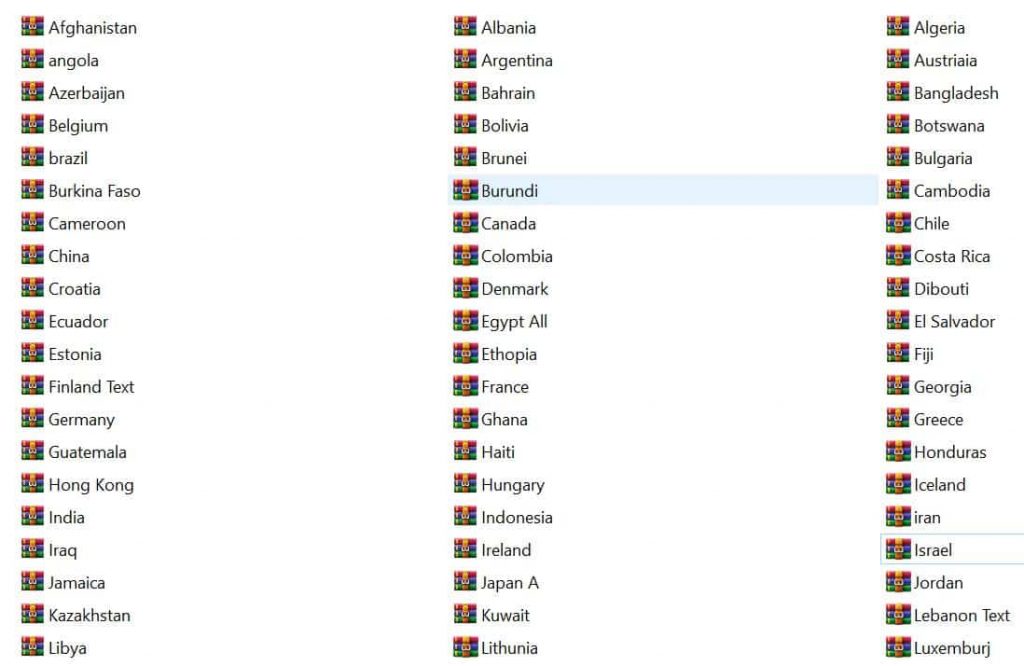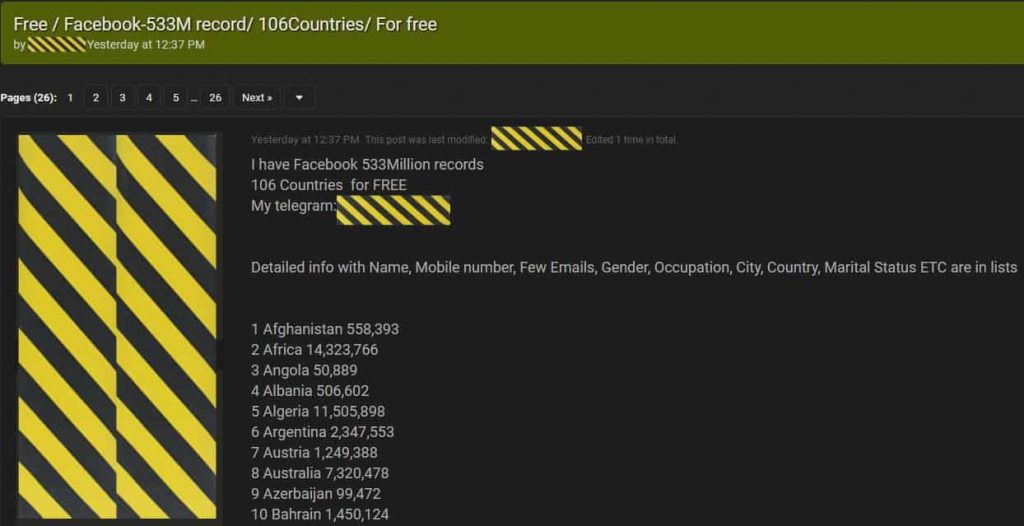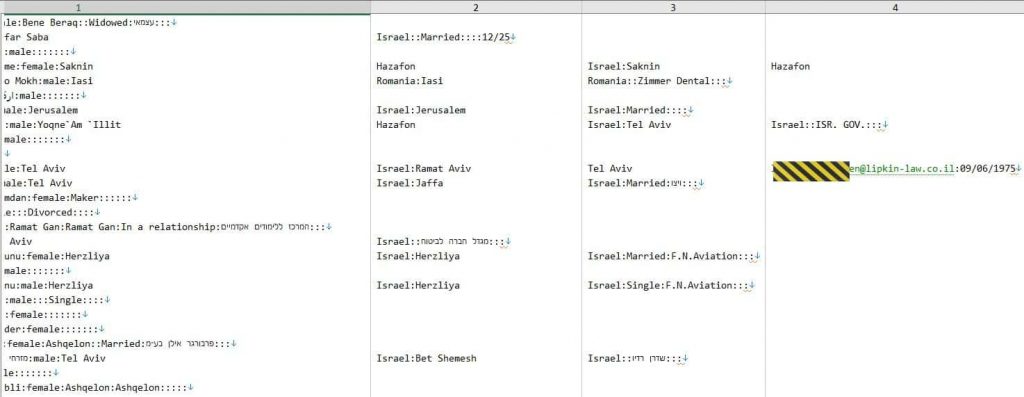The data was leaked earlier today on an infamous hacker forum without users’ Facebook accounts passwords.
For the last couple of years, a Facebook database containing the personal and contact information of more than 500 million users kept popping up on several hacker forums where threat actors offered the data for $30,000.
Hackread.com exclusively reported on the incident back in May 2020 in which the database contained user info from 82 countries. Now, another database with records of 533 million Facebook users from 106 countries has been leaked online.

What is in the leaked data?
It can be confirmed that the database is available on several Telegram channels along with hacker forums. The good news is that no passwords were leaked however, an in-depth analysis of the records will be published later. As of now, the database contains the following information:
- Full names
- Genders
- City
- Country
- Phone numbers
- Email addresses
- Marital status
- Service provider
- Facebook profile UIDs
- Facebook profile links
- Educational institution
- Details from About section
- Occupation (Job description)
Was Facebook hacked or that’s data scrapping?
No, Facebook was not hacked neither were its servers breached to steal your data. This database is the result of web data scrapping which depending on its use is an illegal technique in which a computer program (bots) extracts data from a website.
Remember, third-party firms can use data scrapping, a fairly common practice to extract the personal information of users from websites like Facebook or Twitter. Facebook in particular allows users to access third-party websites by using their existing Facebook login information.
This information can be accessed by cybercriminals in case proper security measures are not implemented. For instance, malicious elements can use ‘scraper bots’ to extract private information anonymously.
List of targeted countries
- 1 Afghanistan 558,393
- 2 Africa 14,323,766
- 3 Angola 50,889
- 4 Albania 506,602
- 5 Algeria 11,505,898
- 6 Argentina 2,347,553
- 7 Austria 1,249,388
- 8 Australia 7,320,478
- 9 Azerbaijan 99,472
- 10 Bahrain 1,450,124
- 11 Bangladesh 3,816,339
- 12 Belgium 3,183,584
- 13 Bolivia 2,959,209
- 14 Botswana 240,606
- 15 Brazil 8,064,916
- 16 Brunei 213,795
- 17 Bulgaria 432,473
- 18 Burkina Faso 6,413
- 19 Burundi 15,709
- 20 Cambodia 2,838
- 21 Cameroon 1,997,658
- 22 Canada 3,494,385
- 23 Chile 6,889,083
- 24 China 670,334
- 25 Colombia 17,957,908
- 26 Costa Rica 1,464,002
- 27 Croatia 659,115
- 28 Cyprus 152,321
- 29 Czech Republic 1,375,988
- 30 Denmark 639,841
- 31 Djibouti 14,327
- 32 Ecuador 310,259
- 33 Egypt 44,823,547
- 34 El Salvador 4,779
- 35 Estonia 87,533
- 36 Ethiopia 12,753
- 37 Fiji 5,364
- 38 Finland 1,381,569
- 39 France 19,848,559
- 40 Georgia 95,193
- 41 Germany 6,054,423
- 42 Ghana 1,027,969
- 43 Greece 617,722
- 44 Guatemala 1,645,068
- 45 Haiti 15,407
- 46 Honduras 16,142
- 47 Hong Kong 2,937,841
- 48 Hungary 377,045
- 49 Iceland 31,343
- 50 India 6,162,450
- 51 Indonesia 130,331
- 52 Iran 301,723
- 53 Iraq 17,116,398
- 54 Ireland 1,449,919
- 55 Israel 3,956,428
- 56 Italy 35,677,323
- 57 Jamaica 385,890
- 58 Japan 428,625
- 59 Jordan 3,105,988
- 60 Kazakhstan 3,214,990
- 61 Kuwait 4,468,134
- 62 Lebanon 1,829,661
- 63 Libya 4,204,514
- 64 Lithuania 220,160
- 65 Luxembourg 188,201
- 66 Macao 414,228
- 67 Malaysia 11,675,894
- 68 Maldives 86,337
- 69 Malta 115,366
- 70 Mauritius 848,558
- 71 Mexico 13,330,561
- 72 Moldova 46,237
- 73 Morocco 18,939,198
- 74 Namibia 409,356
- 75 Netherlands 5,430,388
- 76 Nigeria 9,000,131
- 77 Norway 475,809
- 78 Oman 5,048,532
- 79 Palestine 3,367,576
- 80 Panama 1,502,310
- 81 Peru 8,075,317
- 82 Philippine 879,699
- 83 Poland 2,669,381
- 84 Portugal 2,277,361
- 85 Puerto Rico 130,586
- 86 Qatar 2,526,694
- 87 Russia 9,996,405
- 88 Saudi Arabia 28,804,686
- 89 Serbia 162,898
- 90 Singapore 3,073,009
- 91 Slovenia 229,039
- 92 South Korea 121,744
- 93 Spain 10,894,206
- 94 Sudan 9,464,772
- 95 Sweden 1,092,140
- 96 Switzerland 1,592,039
- 97 Syria 6,939,528
- 98 Taiwan 734,807
- 99 Tunisia 39,526,412
- 100 Turkey 19,638,821
- 101 Turkmenistan 16,279
- 102 United Arab Emirates 6,978,927
- 103 United Kingdom 11,522,328
- 104 Uruguay 1,509,317
- 105 USA 32,315,282
- 106 Yemen 4,617,359
What’s next for Facebook users?
Hackread.com is conducting an in-depth analysis of the leaked data and its results will be published soon. Nevertheless, the victims of the breach are yet again unsuspecting Facebook users who are now open to phishing scams, smishing attacks (SMS phishing), and identity theft using publically available photos on their profiles, etc.
If you are on Facebook, make sure to limit the information you share with the public. Also, keep your personal photos only accessible to those in your friend lists rather than public. Or you can simply learn how to permanently delete your Facebook account.
Did you enjoy reading this article? Do like our page on Facebook and follow us on Twitter.




